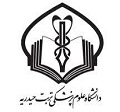(2019) بررسی نقش خودکارآمدی و نوع سبک فرزندپروری مادر در پیش بینی اضطراب کودکان پیش دبستانی. Journal of Torbat Heydariyeh University of Medical Sciences. pp. 57-64. ISSN 2538-2845
|
Text
thums-jms-v6n4p57-fa.pdf Download (555kB) | Preview |
Persian Abstract
زمینه و هدف: تجارب نخستین سال‌های زندگی و نحوه‌ی تعامل مادر با کودک، بنیاد سلامتی یا بیماری کودک را در بزرگسالی مشخص می‌نماید. سبک‌های فرزندپروری و خودکارآمدی مادر دو عامل مهم و موثر در بروز اضطراب کودک محسوب می­شوند. پژوهش حاضر با هدف بررسی نقش خودکارآمدی و سبک فرزندپروری مادر در پیش بینی اضطراب کودکان پیش دبستانی انجام شد. روش­ ها: پژوهش حاضر یک مطالعه توصیفی همبستگی است. جامعه‌ی آماری را مادران کودکان پیش دبستانی مهدکودک‌های شهر مشهد تشکیل می دادند. تعداد 181 نفر از مادران به روش نمونه‌گیری خوشه‌ای انتخاب و به مطالعه وارد شدند. به منظور جمع آوری داده ­ها از مقیاس های خودکارآمدی والدگری دومکا، اضطراب کودکان پیش دبستانی اسپنس و فرزندپروری بامریند استفاده گردید. تجزیه و تحلیل داده ها با استفاده از نرم افزار SPSS  نسخه 22 انجام شد. نتایج: بین میزان خودکارآمدی مادر و اضطراب کودک، همینطور خودکارآمدی مادر و شیوه‌ی فرزندپروری مستبدانه آن­ها به ترتیب (0/2-r=، 0/006≤ P)، (0/24-r=،001/0≤ P)؛ همبستگی معکوس و معناداری مشاهده شد. همچنین سبک فرزندپروری مستبدانه‌ی مادر با اضطراب کودک رابطه مستقیم و معناداری داشت (0/23r=، 001 /0≤ P). نتیجه­ گیری: با توجه به ارتباط سبک فرزندپروری مستبدانه و خودکارآمدی پایین مادر با اضطراب کودکان پیشنهاد می شود در برنامه های توانمندسازی مادران، تعدیل سبک فرزندپروری و افزایش خودکارآمدی مادران مد نظر قرار گیرد.
Title
Investigating the role of Self-Efficacy and Parenting Style of Mothers as Predictors of Anxiety in Preschool Children
Abstract
Background & Aim: The experiences of the first years of life and the interaction style between mother with the child, specifies the foundation of child's health or illness in adulthood. Parenting styles and self-efficacy of mothers are two important factors that can affect child's anxiety. Therefore, the present study was conducted to determine the role of mother's self-efficacy and parenting style in predicting the anxiety of preschool children (5 and 6 years old) in Mashhad. Methods: Current study is a descriptive correlational study. The statistical population of this study included mothers of preschool children in kindergartens of Mashhad who were selected by random cluster sampling. The sample size in this study was 181 people. Three scales used in this study were self-efficacy of Dumka (PSAM), Baumrind Parenting styles and Spence scale of preschool children anxiety (PAS). SPSS (23) software was used for data analysis. Results: Low self-efficacy of the mother and her authoritarian parenting style can predict child's anxiety. There was a negative and significant correlation between self-efficacy of mothers and child anxiety (P≤0.006, r=-0.2); there was also a negative and significant correlation between mother's self-efficacy and authoritarian parenting style (P≤0.001, r=-0.24); the relationship between child anxiety and authoritarian parenting style was positive and significant (P≤0.001, r=0.23). Conclusion: The obtained results showed that the authoritarian parenting style and low self-efficacy have the ability to predict child's anxiety; therefore, it is suggested to consider modification of parenting style and increasing the self-efficacy of mothers in maternal empowerment programs.
| Item Type: | Article |
|---|---|
| Keywords: | parenting styles, parenting self-efficacy, children’s anxiety |
| Page Range: | pp. 57-64 |
| Journal or Publication Title: | Journal of Torbat Heydariyeh University of Medical Sciences |
| Journal Index: | Not Index |
| Volume: | 6 |
| Number: | 4 |
| Publisher: | Torbat Heydariyeh University of Medical Sciences |
| ISSN: | 2538-2845 |
| Depositing User: | دکتر محبوبه عبداللهی |
| URI: | http://eprints.thums.ac.ir/id/eprint/1150 |
Actions (login required)
 |
View Item |



